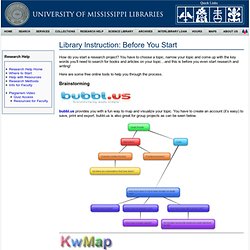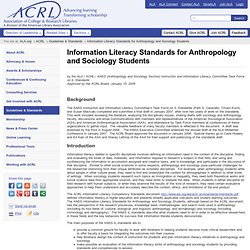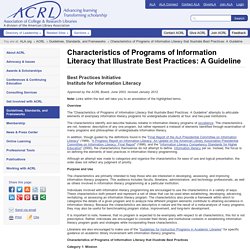

Before You Start: Instruction Sessions: University of Mississippi Libraries. How do you start a research project?

You have to choose a topic, narrow your topic and come up with the key words you’ll need to search for books and articles on your topic…and this is before you even start research and writing! Here are some free online tools to help you through the process. Brainstorming bubbl.us provides you with a fun way to map and visualize your topic. You have to create an account (it’s easy) to save, print and export. bubbl.us is also great for group projects as can be seen below. KwMap claims to be a “Keyword Map for the Whole Internet”! The Wonder Wheel is a visual concept map in Google. ATTN:To use the Wonder Wheel, first disable Google Instant--see Where did Google's Wonder Wheel Go? To use Wonder Wheel, perform a regular search in Google (link above). Click around and find out more about a specific topic. VisuWords is an online graphical dictionary. Copyright © 2012 The University of Mississippi.
Homepage. Standards Toolkit. Standards & Guidelines. ACRL is the source that the higher education community looks to for Standards, Guidelines, and Frameworks on academic libraries. ACRL develops Standards, Guidelines, and Frameworks to help libraries, academic institutions, and accrediting agencies understand the components of an excellent library.
These Standards, Guidelines, Frameworks, and model statements are reviewed and updated by the membership on a regular basis. Information Literacy in Religion/Religious Studies. Info Lit IQ Test. ACRL. By the ALA / ACRL / ANSS (Anthropology and Sociology Section) Instruction and Information Literacy Committee Task Force on IL Standards Approved by the ACRL Board, January 15, 2008 Background The ANSS Instruction and Information Literacy Committee’s Task Force on IL Standards (Patti S.

Caravello, Triveni Kuchi, and Susan Macicak) completed and submitted a final draft in January 2007, after over two years of work on the standards. This work included reviewing the literature, analyzing the disciplinary issues, sharing drafts with sociology and anthropology faculty, discussions and email communications with members and representatives of the American Sociological Association (ASA) and American Anthropological Association (AAA), and attendance by Task Force members at conferences of these organizations to gather input. The valuable feedback of many faculty members is reflected in the document. Introduction The main purposes of the ANSS IL standards are to: What the student needs to do: 2.
Characteristics of Programs of Information Literacy that Illustrate Best Practices. Approved by the ACRL Board, June 2003, revised January 2012.

Note: Links within the text will take you to an annotation of the highlighted terms. Overview. ACRL Philosophical, Religious, and Theological Discussion Group. ProjInfoLit's Channel. Project Information Literacy: A large-scale study about early adults and their research habits. Streams of Content, Limited Attention: The Flow of Information through Social Media (EDUCAUSE Review.
© 2010 danah boyd. The text of this article is licensed under the Creative Commons Attribution-NonCommercial-ShareAlike 3.0 License ( EDUCAUSE Review, vol. 45, no. 5 (September/October 2010): 26–36 danah boyd (dmb@microsoft.com) is Social Scientist at Microsoft Research and a Research Associate at Harvard's Berkman Center for Internet and Society Comments on this article can be posted to the web via the link at the bottom of this page. In his seminal book Flow: The Psychology of Optimal Experience (1990), Mihaly Csikszentmihalyi argued that people are happiest when they can reach a state of "flow.
" If we consider what it means to be "in flow" in an information landscape defined by networked media, we will see where Web 2.0 is taking us. Lately, technologists have been talking a lot about content streams or streams of information. From Broadcast to Networked For the last few centuries, we have been living in an era of broadcast media, but we have been moving to an era of networked media. Information Literacy: A Neglected Core Competency (EDUCAUSE Quarterly. College students think of information seeking as a rote process and tend to use the same small set of information resources no matter their question.
Information literacy is essential for lifelong learning and empowers individuals and societies. Our educational system should expose students to information literacy from elementary school through postsecondary education so that it is a habit of mind they can call upon throughout their lives. Collaborative efforts between faculty, librarians, technology professionals, and others can develop students who graduate with information literacy competency. Researchers at the Information School at the University of Washington released an important and thought-provoking report in late 2009: "Lessons Learned: How College Students Seek Information in the Digital Age. "1 The study confirms and expands on the results of other reports. The findings are troubling. The primary sources they use for course work are course readings and Google. Information Literacy - 182 Resources. Learning the Ropes: How Freshmen Conduct Course Research Once They Enter College December 4, 2013 "This paper presents findings about the challenges today’s college freshmen face, and the information seeking strategies they develop, use, and adapt as they make the transition from high …
Educom Review. Info Lit for Faculty.